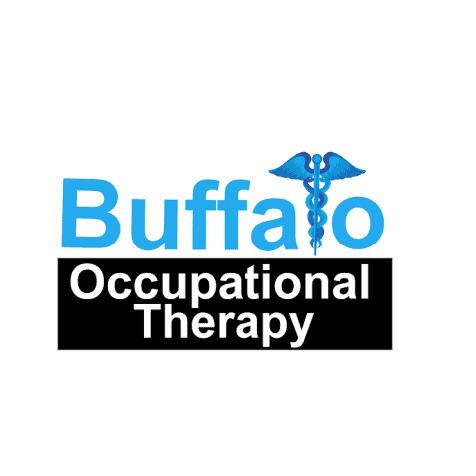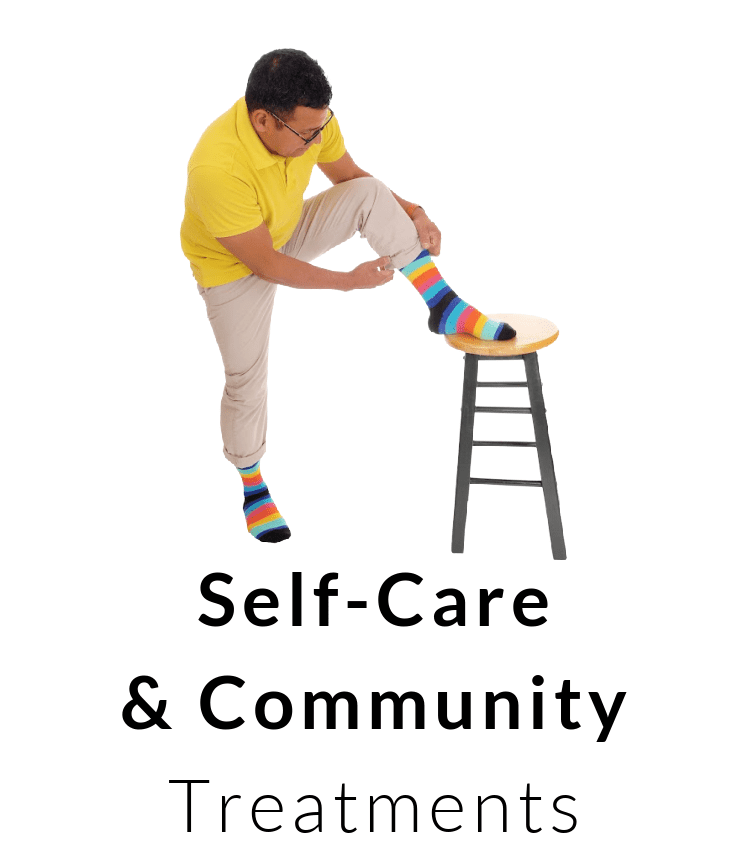
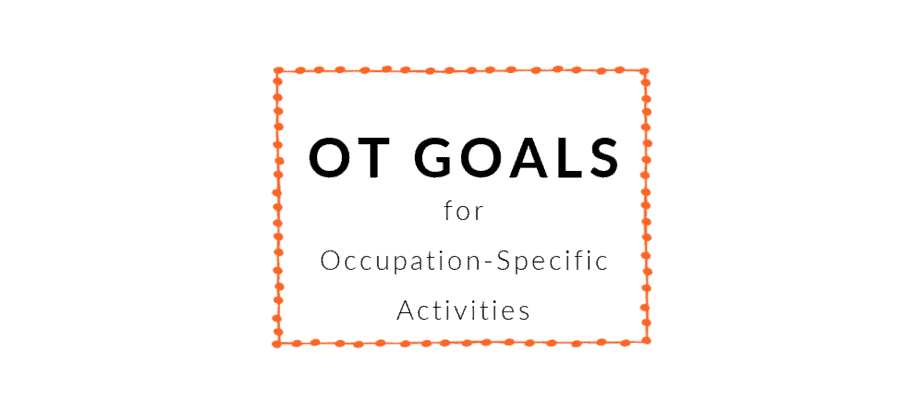
OT Goals for Occupation Specific Activities
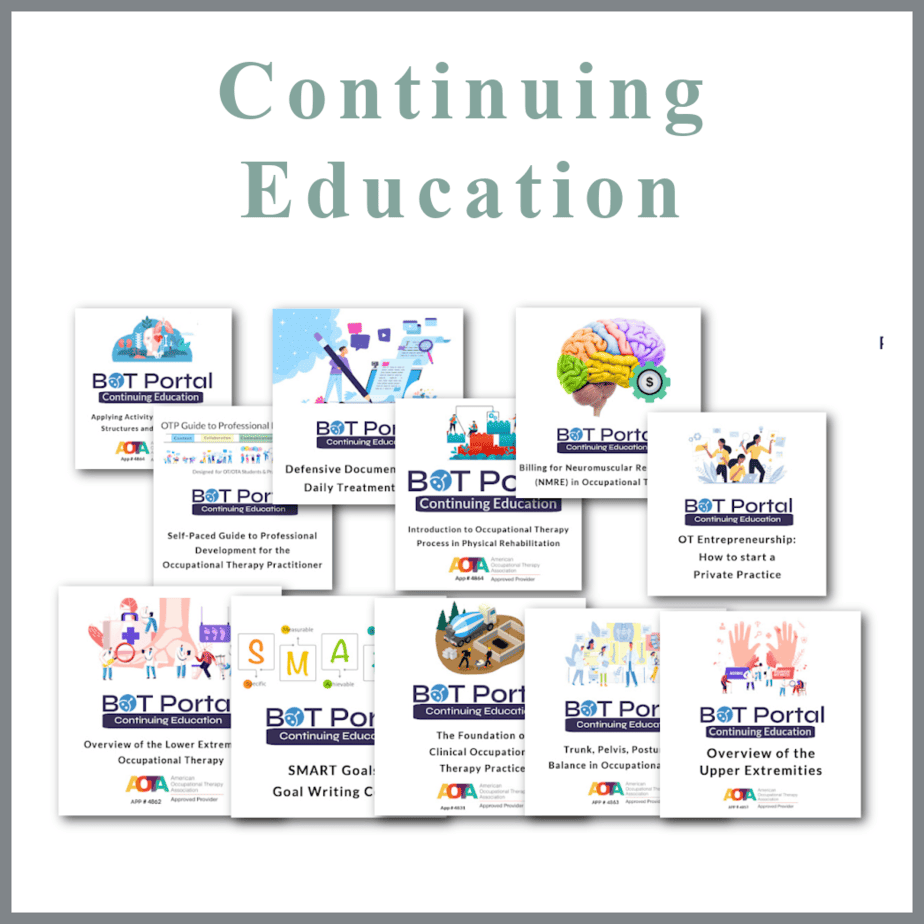

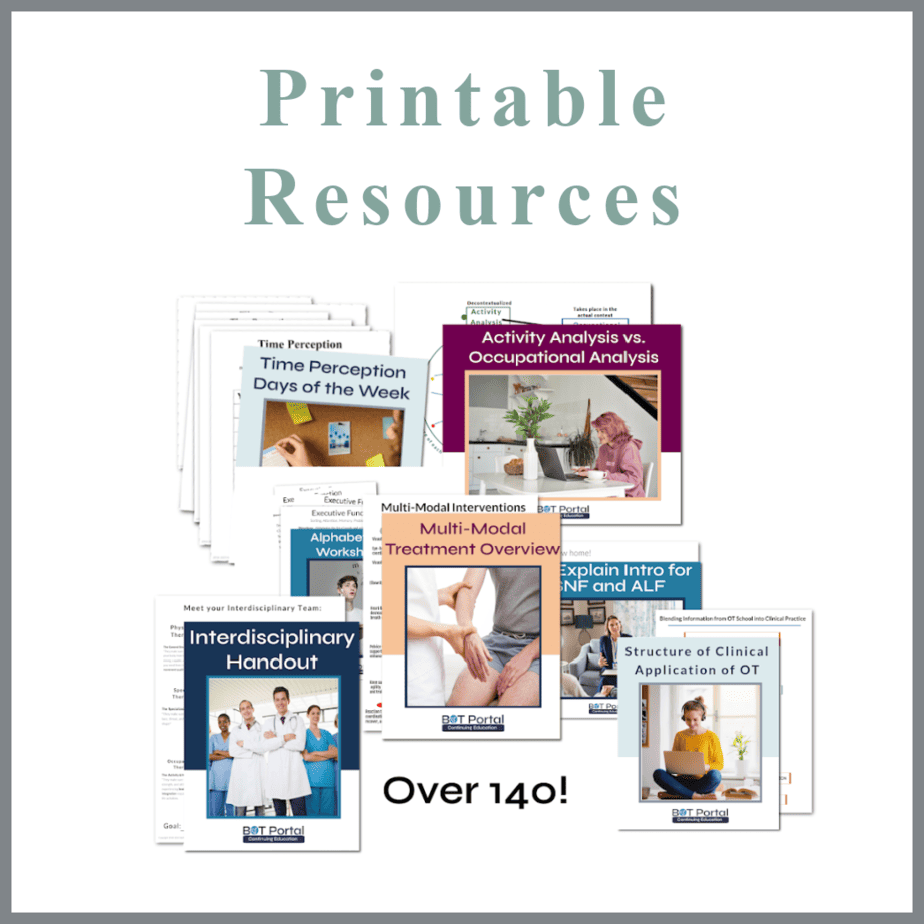

Membership Perks
Two Membership Options!
Your investment gives you resources to save you stress, self-doubt, and burnout as you become a confident and competent practitioner who can stand up for your professional point of view and scope of practice.
Possible Performance Deficits in ADLs
Toileting
- Unsupported sitting tolerance of at least 15 minutes
- Unsupported standing tolerance (or one hand support) for at least 8 minutes
- Dynamic sitting balance with trunk rotation
- Dynamic standing balance with gaze shift and trunk rotation
- See more on the BOT Portal
Grooming
(nail clipping, shaving, washing face, make-up, etc)
- Unsupported/Supported sitting tolerance of at least 20 minutes
- (Possible) Unsupported standing tolerance without support for at least 20 minutes
- Dynamic sitting balance with trunk rotation, trunk flexion & ability to right to midline
- Dynamic standing balance with gaze shift and trunk rotation, trunk flexion & ability to right to midline
- Dual tasking endurance (executive function & UE mobility)
- See more on the BOT Portal
Feeding
- Unsupported/Supported sitting tolerance of at least 20 minutes
- Self-awareness of proper body mechanics and positioning to enhance feeding performance
- Improved Dual tasking (DT) performance (cognition + motor) to maintain safety, attention to task and sociocognitive and sociocommunication components feeding
- Sequencing, task initiation, task termination
- See more on the BOT Portal
Bathing
- Safety, insight, and awareness during mobility and/or maintain precautions/contraindications
- Sufficient problem solving skills to address spontaneous bathing-related problems
- Sensory integration and ability to regulate response to varying temperatures
- Upper body and lower body strength
- Sufficient core and back strength (power and endurance) to support dynamic load of upper body and lower body mobility
- Unsupported/Supported sitting tolerance of at least 20 minutes
- Transitional movements during shower transfer
- See more on the BOT Portal
Upper Body Dressing
- Selection and retrieval of time and weather-appropriate articles of clothing
- Unsupported sitting tolerance of at least 20 minutes
- Dynamic sitting balance with trunk rotation and trunk flexion with return to midline
- Dual tasking endurance (cognition + mobility)
- Sequencing, Task initiation, Task termination
- See more on the BOT Portal
Lower Body Dressing
- Unsupported sitting tolerance of at least 15 minutes
- Unsupported standing tolerance (or one hand support) for at least 8 minutes
- Dynamic sitting balance with trunk rotation
- Dynamic standing balance with gaze shift
- Dual tasking endurance (cognition + mobility)
- Management of ambulation aid during task performance
- See more on the BOT Portal
Donning Socks and Shoes
- Sufficient upper body, trunk, and lower body range of motion to complete task
- Good dynamic sitting balance with trunk rotation and trunk flexion with return to midline
- See more on the BOT Portal
Simple Goals for Occupation Specific Activities
The patient will demonstrate safe transitional movements from sit to stand and stand to sit on multiple seated surfaces [sofa, bed, chair, recliner] with /without armrests as evidenced 5 successful transitions from each surface without physical assistance with [xx] weeks.
The patient will demonstrate safe use of adaptive equipment/adapted mobility patterns during participation in [activity] as evidenced by successful performance of [activity] without LOB or need of physical or verbal assistance within 12 weeks.
The patient will demonstrate the performance skills and body functions necessary for completion of medication management with [level of assistance] as evidenced by completion of a medication management assessment within 12 weeks.
The patient will demonstrate the performance skills and body functions necessary for completion of [basic/moderate/intermediate] levels of financial management with [level of assistance] within 12 weeks.
The patient will demonstrate increased gross motor coordination of BUE and BLE as evidenced by completion of a walking/ball bounce assessment of 50 bounces requiring ambulation/stepping in all planes of movement without LOB within [xx] weeks in order to improve IADL and leisure occupational performance.
The patient will demonstrate adherence to [type of precaution] weight-bearing precautions and physician-placed AROM restrictions as evidenced by self-initiated correction or abstention of these elements during xx/xx consecutive treatments within [xx] weeks.
The patient will perform toileting hygiene after demonstrating sufficient abilities in body functions, structures, and performance skills required for activity completion with [level of assistance] within [xx] weeks.
The patient will perform upper body dressing while [standing/seated] [with/without back support] after demonstrating sufficient abilities in body functions, structures, and performance skills required for activity completion with [level of assistance] within [xx] weeks.
The patient will perform showering using DME as necessary while [standing/seated] [with/without back support] after demonstrating sufficient abilities in body functions, structures, and performance skills required for activity completion with [level of assistance] within [xx] weeks.
See more on the BOT Portal
Goals Continuums and Progressions for Occupation Specific Activities
Psychosocial Balance
The patient will demonstrate increased person-environment -occupation balance as evidenced by the achievement of a balanced relationship between person and health management
Checkpoints:
- Complete and discuss roles checklist (25%)
- Complete and discuss Kawa River Creation (50%)
- Completion and reflection of 2-3 action oriented goals (75%)
- Reflection and discussion of self vs diagnosis (100%)

Fine Motor Occupational Performance
The patient will increase fine motor strength of bilateral hands as evidenced by at least a 11lb increase in overall pinch objective measurements using a pinch gauge in order to improve fine motor performance when donning/doffing jackets and opening jars/caps/lids.
Gross Grasp: (NORM: 25.3 lb)
L: 9.2 lb R: 8.2
Checkpoints:
- Increase 4 lbs (25%) 3 weeks
- Increase 7lbs (50%) 6 weeks
- Increase 9lbs (75%) 9 weeks
- Goal completion (100%) 12 weeks

Handwriting Goal
The patient will demonstrate increased occupational performance of handwriting task as evidenced by improvement of speed, accuracy, and quality of handwriting assessment (1-minute ABC-writing assessment) based on clinical insight, reasoning, and skill.
Checkpoints:
- Complete (1-minute) ABC-writing assessment on blank printer paper to guage visual perceptual skills as well as motor components of handwriting. (Video record prehension, posture, and execution of task) (33.3%)
- Improve in-hand manipulation and translation abilities to improve overall prehension by manipulating 25/25 beads from table to palm to corresponding targets (By color) using tip pinch in less than 3m30s (33.3%)
- 8-10 sessions metronome training of gross hand/isolated digit movement from 55bpm to 120bpm (50 repetitions each hand) without fatigue (33.3%
Micrographia Goal
See more on the BOT Portal

Life Role Goal
The patient will improve participation and performance of desired role…See more on the BOT Portal
Lower Extremity Functional Scale
The patient will demonstrate an improvement in occupations of the lower extremities as evidenced by an increase of 60 points on the Lower Extremity Functional Scale within 18 weeks.
Deficits: All activities are extremely difficult or quite a bit difficulty
Checkpoints:
- (4.5 weeks) Improvement by 15 points – 25%
- (9 weeks) Improvement by 30 points – 50%
- (13.5 weeks) (Improvement by 45 points – 75%
- (18 weeks) Improvement by 60 points – 100%
Health Management of Parkinson’s Disease
The patient will demonstrate increased self-efficacy in the health management of chronic disease symptoms manifestation of dystonia, dyskinesias, and pain related to PD as evidenced by training, application, discussion, and post-trial feedback of available inhibitory and alternative pain management strategies. The goal is to have the patient rate each strategy on a scale from 1 to 10 of understanding before education and the same likert scale post with a higher degree of understanding noted. Different strategies will be developed over the length of the plan of care.
Checkpoints:
[Not a continuum – each checkpoint can be worked on throughout sessions regardless of timeframe]
- Ankle and Wrist weights for increase somatosensory regulation (20%)
- Kinesiology Tape (20%)
- Metronome Training (20%)
- Cold Modality (20%)
- Stretch and self-massage (20%)

Patient Specific Functional Scale
See more on the BOT Portal

Employment Goal
See more on the BOT Portal

Quick Dash Goal
See more on the BOT Portal
Don Socks Goal
See more on the BOT Portal
